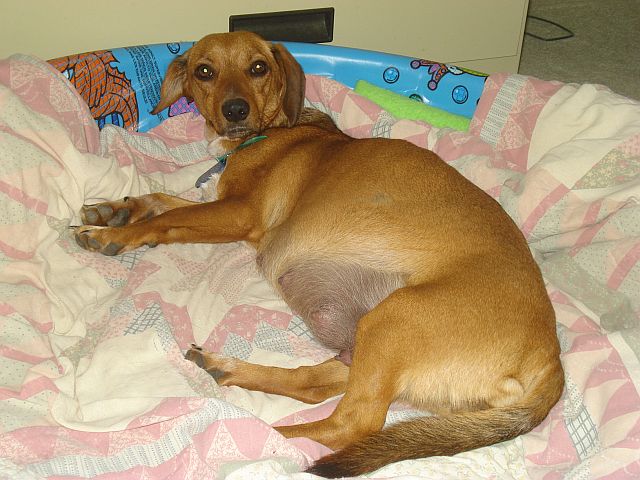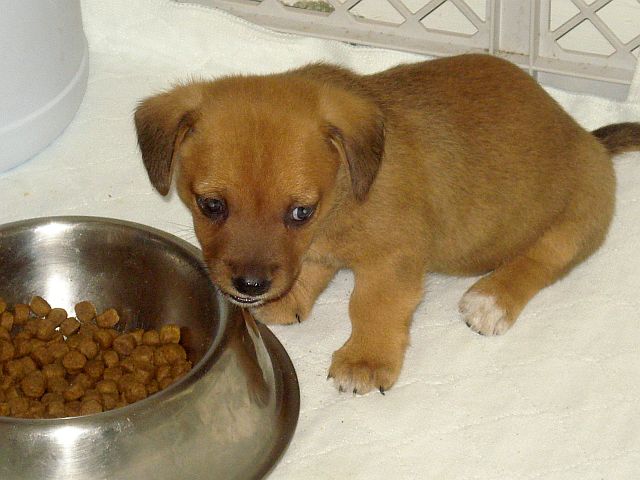Here is their story:
On April 23, 2014, a transporter brought a full term pregnant Dachshund mix to one of our Rose's Rescue foster moms from a pound in rural Jackson County, Ohio. The next evening, Rowan delivered six apparently healthy puppies.




Eight days later, one of the puppies had diarrhea (no blood, no mucous - just milk going right through) and became dehydrated and weak. Formula was given orally with a syringe and the antibiotic Albon was also administered (syringed orally) and the puppy fully recovered. We do not know if this puppy's episode was related to the parvo or not.
 Early in the morning on May 25 when the puppies were just over 4 weeks old, Cuffy, the largest and most robust puppy in the litter, was making moaning sounds and was lethargic. All puppies had been playing and active only hours before. The foster mom thought it sounded like he had a bellyache. Within an hour, the puppy was taken to the Stark County Veterinary Emergency Clinic. A parvo test was administered and it was NEGATIVE. The next step, the vet said, was to take some X-rays and do some blood tests. She took the puppy to the back and returned a short time later to say that the puppy had died. She was surprised as he did not appear to have any life-threatening symptoms, and guessed that he may have inhaled some gruel that got into his respiratory system.
Early in the morning on May 25 when the puppies were just over 4 weeks old, Cuffy, the largest and most robust puppy in the litter, was making moaning sounds and was lethargic. All puppies had been playing and active only hours before. The foster mom thought it sounded like he had a bellyache. Within an hour, the puppy was taken to the Stark County Veterinary Emergency Clinic. A parvo test was administered and it was NEGATIVE. The next step, the vet said, was to take some X-rays and do some blood tests. She took the puppy to the back and returned a short time later to say that the puppy had died. She was surprised as he did not appear to have any life-threatening symptoms, and guessed that he may have inhaled some gruel that got into his respiratory system.The next afternoon (Memorial Day), the remaining five puppies were playing in the yard when one
 of the puppies (Champ, the one who'd had the bout with diarrhea when he was just over a week old) laid
of the puppies (Champ, the one who'd had the bout with diarrhea when he was just over a week old) laid
down in the grass somewhat suddenly. Since he had been on his foster mom's lap and appeared fine only a minute or two before, she thought he was just tired and needed a nap. He then made one or two moans like the first puppy did, causing the foster mom to jump up immediately and pick him up. He was already dying and moments later, he was gone.
The following morning, all four remaining puppies were taken to our veterinarian, Dr. Tiffany Drach at Rootstown Veterinary Hospital, to be examined. All checked out as healthy. Blood work was run on one of them as a representational sample, and everything was normal - electrolytes, glucose levels, kidney and liver function.
Two days later (Thursday, May 29), another puppy (Cozy) was observed to be in slight distress. If the foster mom had not been constantly looking for any kind of warning signs because of the previous two puppy losses, this would have been overlooked, as the slightly rapid breathing was not extreme or obvious. She picked up the pup immediately but again, it was too late. Cozy died moments later.

Within an hour, all three remaining pups were taken to Stow Kent Animal Hospital (our vet was not in at that time) along with the remains of the pup who had just died. The three survivors again checked out as "healthy". We requested a necropsy for Cozy, but Dr. Jacobson suggested that we instead send her down to the Animal Disease Diagnostic Lab in Reynoldsburg, Ohio as they could do much more extensive testing than the vet office could, and at a much lower cost.
Cozy was transported down to the lab and the necropsy was begun the next day. The pathologist observed viral inclusions in the heart muscle, but more testing was needed to get a definitive diagnosis. Two weeks later, the lab report was complete and concluded that the puppy had positively died from parvo myocarditis - a condition where parvo infects the heart muscle of young puppies rather than the typical intestinal manifestation. It is the SAME parvo virus that usually attacks the intestines; it is NOT a different strain or mutation; it is the familiar canine parvovirus-2 (CPV2). This condition is so rare that very little information is available, even to veterinarians. Still less is known about littermates who do not initially succumb.
Next, we had the three remaining pups (Chessie, Cubby, and Chumley) titer-tested to see if they'd had parvo or if perhaps by some stroke of luck, they had escaped getting it. All three tested positive for Parvo with the titer test.
Meanwhile, Dr. Jacobson had been in touch with local canine cardiology veterinarian Dr. Lori Hitchcck at Metropolitan Veterinary Hospital Specialists. Dr. Hitchcock offered to see our puppies to try to determine how they had been affected by the virus and if they had sustained any heart damage. She will also continue to see these puppies so their long-term cardiac health can be documented. Since Dr. Hitchcock was already scheduled to be on vacation at the time, the puppies were examined and tested by her resident, Dr. Rebecca Fields, DVM on June 23.
The results were mixed. Chessie, a black and tan female, showed no signs of damage. Cubby (male, white with brown markings) had some damage and may or may not suffer ill-effects as he gets older. Chumley's heart, however, showed a great deal of heart damage and was given a very poor prognosis.



Again, none of these puppies showed any signs or symptoms of being sick. They had normal stools, good appetite, were active (other than Cuffy just an hour or so before he died), and had not been vomitting. Initial parvo tests both on Cuffy and Cozy (at the lab) from fecal samples taken rectally were negative. That is because the virus remained in the heart and never got to their intestines. The mother, by the way, never exhibited any signs of being sick, either. We don't know if she had parvo before she came to us and recovered, or if her own immune system was able to fight it off seemingly without affecting her. We also don't know if she passed it to her puppies while she was pregnant or immediately after whelping.
All three puppies have been placed in loving homes. Chessie and Cubby were adopted together. Chumley went to a previous adopter in Pittsburgh, and was put on Enalapril by Dr. Hitchcock. He was also getting three heart-friendly amino acids, plus fish oil for the Omega-3s and Vitamin E.
Chumley passed, as expected from his diagnosis, in October 2014. Cubby's condidtion was deteriorating at that time.
Rose's Rescue would like to acknowledge and thank all of the veterinarians who examined or provided input towards diagnosing, or provided expertise for our puppies in any way, and in particular Drs Jacobson and Hitchcock, who have gone above and beyond in order to help us:
Dr. Heidi Knoblich, DVM, Stark County Veterinary Emergency Clinic
Dr. Tiffany Drach, DVM, Rootstown Veterinary Hospital
Dr. Dana Jacobson, DVM, Stow Kent Animal Hospital
Dr. Alice Roudabush, DVM, DACVP, Animal Disease Diagnostic Laboratory
Dr. Karen Fox, DVM, PhD, DACVP
Dr. Rebecca Fields, DVM,residency trained in cardiology, now with Med Vet
Dr. Lori S. Hitchcock, DVM, Diplomate ACVIM (Cardiology), Ohio Veterinary Cardiology, Ltd. at Akron Metropolitan Veterinary Hospital
We will continue to update this page with any changes, additional test results, or other pertinent information that may become available. All lab reports can be viewed by clicking on the links below.
Necropsy and Lab Report from ADDL
Initial echocardiographic report for Chessie
Initial echocardiographic report for Cubby
Initial echocardiographic report for Chumley (Chumley had vomitting and diarrhea the day he went to the cardiologist. He later tested positive and was treated for coccidia - the symptoms he had during his cardio examination and that were mentioned in the report were unrelated to the Parvo.)
The following morning, all four remaining puppies were taken to our veterinarian, Dr. Tiffany Drach at Rootstown Veterinary Hospital, to be examined. All checked out as healthy. Blood work was run on one of them as a representational sample, and everything was normal - electrolytes, glucose levels, kidney and liver function.
Two days later (Thursday, May 29), another puppy (Cozy) was observed to be in slight distress. If the foster mom had not been constantly looking for any kind of warning signs because of the previous two puppy losses, this would have been overlooked, as the slightly rapid breathing was not extreme or obvious. She picked up the pup immediately but again, it was too late. Cozy died moments later.

Within an hour, all three remaining pups were taken to Stow Kent Animal Hospital (our vet was not in at that time) along with the remains of the pup who had just died. The three survivors again checked out as "healthy". We requested a necropsy for Cozy, but Dr. Jacobson suggested that we instead send her down to the Animal Disease Diagnostic Lab in Reynoldsburg, Ohio as they could do much more extensive testing than the vet office could, and at a much lower cost.
Cozy was transported down to the lab and the necropsy was begun the next day. The pathologist observed viral inclusions in the heart muscle, but more testing was needed to get a definitive diagnosis. Two weeks later, the lab report was complete and concluded that the puppy had positively died from parvo myocarditis - a condition where parvo infects the heart muscle of young puppies rather than the typical intestinal manifestation. It is the SAME parvo virus that usually attacks the intestines; it is NOT a different strain or mutation; it is the familiar canine parvovirus-2 (CPV2). This condition is so rare that very little information is available, even to veterinarians. Still less is known about littermates who do not initially succumb.
Next, we had the three remaining pups (Chessie, Cubby, and Chumley) titer-tested to see if they'd had parvo or if perhaps by some stroke of luck, they had escaped getting it. All three tested positive for Parvo with the titer test.
Meanwhile, Dr. Jacobson had been in touch with local canine cardiology veterinarian Dr. Lori Hitchcck at Metropolitan Veterinary Hospital Specialists. Dr. Hitchcock offered to see our puppies to try to determine how they had been affected by the virus and if they had sustained any heart damage. She will also continue to see these puppies so their long-term cardiac health can be documented. Since Dr. Hitchcock was already scheduled to be on vacation at the time, the puppies were examined and tested by her resident, Dr. Rebecca Fields, DVM on June 23.
The results were mixed. Chessie, a black and tan female, showed no signs of damage. Cubby (male, white with brown markings) had some damage and may or may not suffer ill-effects as he gets older. Chumley's heart, however, showed a great deal of heart damage and was given a very poor prognosis.



Again, none of these puppies showed any signs or symptoms of being sick. They had normal stools, good appetite, were active (other than Cuffy just an hour or so before he died), and had not been vomitting. Initial parvo tests both on Cuffy and Cozy (at the lab) from fecal samples taken rectally were negative. That is because the virus remained in the heart and never got to their intestines. The mother, by the way, never exhibited any signs of being sick, either. We don't know if she had parvo before she came to us and recovered, or if her own immune system was able to fight it off seemingly without affecting her. We also don't know if she passed it to her puppies while she was pregnant or immediately after whelping.
All three puppies have been placed in loving homes. Chessie and Cubby were adopted together. Chumley went to a previous adopter in Pittsburgh, and was put on Enalapril by Dr. Hitchcock. He was also getting three heart-friendly amino acids, plus fish oil for the Omega-3s and Vitamin E.
Chumley passed, as expected from his diagnosis, in October 2014. Cubby's condidtion was deteriorating at that time.
Rose's Rescue would like to acknowledge and thank all of the veterinarians who examined or provided input towards diagnosing, or provided expertise for our puppies in any way, and in particular Drs Jacobson and Hitchcock, who have gone above and beyond in order to help us:
Dr. Heidi Knoblich, DVM, Stark County Veterinary Emergency Clinic
Dr. Tiffany Drach, DVM, Rootstown Veterinary Hospital
Dr. Dana Jacobson, DVM, Stow Kent Animal Hospital
Dr. Alice Roudabush, DVM, DACVP, Animal Disease Diagnostic Laboratory
Dr. Karen Fox, DVM, PhD, DACVP
Dr. Rebecca Fields, DVM,residency trained in cardiology, now with Med Vet
Dr. Lori S. Hitchcock, DVM, Diplomate ACVIM (Cardiology), Ohio Veterinary Cardiology, Ltd. at Akron Metropolitan Veterinary Hospital
We will continue to update this page with any changes, additional test results, or other pertinent information that may become available. All lab reports can be viewed by clicking on the links below.
Necropsy and Lab Report from ADDL
Initial echocardiographic report for Chessie
Initial echocardiographic report for Cubby
Initial echocardiographic report for Chumley (Chumley had vomitting and diarrhea the day he went to the cardiologist. He later tested positive and was treated for coccidia - the symptoms he had during his cardio examination and that were mentioned in the report were unrelated to the Parvo.)

